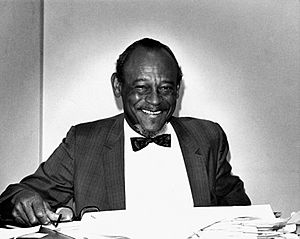Isaiah DeQuincey Newman facts for kids
Quick facts for kids
Isaiah DeQuincey Newman
|
|
|---|---|
 |
|
| Member of the South Carolina Senate from the 19th district |
|
| In office 1983–1985 |
|
| Preceded by | Alex Sanders |
| Succeeded by | Kay Patterson |
| State Field Director, South Carolina NAACP | |
| In office 1960–1969 |
|
| Preceded by | Hudson D. Anderson |
| Succeeded by | Isaac Williams |
| Personal details | |
| Born | April 17, 1911 Darlington County, South Carolina |
| Died | July 31, 1985 (aged 74) Columbia, South Carolina |
| Resting place | Greenlawn Memorial Park, Columbia |
| Political party | Republican (until 1958), then Democratic |
| Spouse | Anne Pauline Hinton (m. 1937) |
| Children | Emily Morris DeQuincey |
| Alma mater | Clark College Gammon Theological Seminary |
Isaiah DeQuincey Newman (born April 17, 1911 – died July 31, 1985) was an important leader in the Civil Rights Movement. He was also a Methodist pastor and a state senator in South Carolina. He helped create the Democratic Progressive Party. He also worked as the state field director for the NAACP in South Carolina from 1960 to 1969.
Contents
Isaiah Newman's Early Life
Newman was born in Darlington County, South Carolina. His parents were Reverend Melton C. Newman and Charlotte Elizabeth Morris. When he was eight years old, Newman saw a terrible event. He witnessed the Ku Klux Klan set fire to a train car with an African American man inside.
Newman later said this event made him want to fight for fairness. He explained that his father could not help the man without risking his own life. This moment deeply affected Newman and inspired him to work for a more just society.
He finished high school at Claflin College. In 1931, he became a minister in the United Methodist Church. He earned a bachelor's degree from Clark College. He also received a divinity degree from Gammon Theological Seminary. Both schools are in Atlanta, Georgia. For the next 40 years, he served in United Methodist Churches in Georgia and South Carolina.
Working with the NAACP
In 1943, Newman helped start a local branch of the NAACP in Orangeburg, South Carolina. The NAACP is a group that works for equal rights for African Americans. He held many different jobs within the South Carolina NAACP.
In 1960, he became the state field director. He held this important position until 1969. During his time, South Carolina was changing a lot. One sad event was the Orangeburg Massacre. In this event, the South Carolina National Guard shot and killed three students from South Carolina State College.
Isaiah Newman's Political Career
Newman first belonged to the Republican Party. However, he became unhappy with their views on segregation, which was the separation of people by race. He was present at the first meeting to create the Progressive Democratic Party. This was a party led by Black people. It focused on achieving equality and ending segregation.
By 1958, he joined the Democratic Party. He was chosen as a delegate for the Democratic National Convention in 1968, 1972, and 1980. These conventions are where the party chooses its candidate for president.
After working with the NAACP, Newman led the Governor's Office of Rural Development. This job lasted from 1975 to 1981. His main goal was to fight poverty and hunger in the countryside areas of South Carolina.
In 1983, Newman made history. He was the first African American to be elected to the South Carolina State Senate since 1887. That was during the time called Reconstruction, after the Civil War.
Later Life and Legacy
In 1985, Newman had to leave the South Carolina Senate. He was battling lung cancer and emphysema, which are serious lung conditions. He passed away in Columbia on July 31, 1985.
In 1986, a part of South Carolina Highway 277 was named the "I. DeQuincey Newman Freeway." This was done by leaders in Richland County and the Highway Commission.
In 2001, the University of South Carolina honored him. They created the I. DeQuincey Newman Institute for Peace and Social Justice. They also started a special teaching position (an endowed chair) with the same name. This position is part of the College of Social Work.

